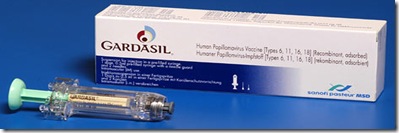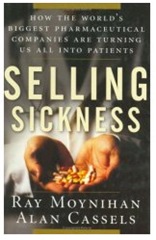| 图片: | |
|---|---|
| 名称: | |
| 描述: | |
- 关于HPV疫苗副作用大讨论!!!!!!!
英国首例注射宫颈癌疫苗死亡病例引发恐慌(图)(转自网络)
国际在线专稿:据英国《每日邮报》9月30日报道,英国一名14岁女学生娜塔莉·莫顿(Natalie Morton)27日注射完宫颈癌(cervical cancer)疫苗后猝死,是首宗怀疑因疫苗副作用的致命个案,引发英国民众的恐慌。英国当局对其进行验尸以确定死因,并决定将这项自去年9月起的全国宫颈癌疫苗接种计划暂停2日。
该校校长罗伯茨已致函学生家长:“一名女孩对疫苗出现罕见而极端的反应”,呼吁家长留意女儿接种后出现的任何不适症状,包括注射处出现短时间轻微疼痛、头痛、肌肉酸痛、疲倦和轻微发烧。”
但目击娜塔莉出事的同学说,不少同学事后都哭了起来,感到非常担心。因为每人总共需要接种3剂疫苗,很多人都不想再注射,但医护人员说若停止接种,将出现副作用。学生们的母亲忧心忡忡,感觉自己的女儿被当做白老鼠。
英国去年开始为全国12至13岁少女接种宫颈癌疫苗,并在2011年前扩大至所有18岁以下少女。尽管卫生官员强调接种计划每年挽救700人的性命,但专家指疫苗带来的副作用盖过其效用,要求当局停止该项国民接种计划的声音日益高涨。
有药物安全专家指出,宫颈癌疫苗会引起恶心、肌肉酸痛、晕眩、视力模糊等副作用,严重者甚至会出现身体抽搐,导致脑部受损及精神病。医疗监管部门数据显示,在接种的一年间,估计已接种的150万名女孩中有超过4000人出现副作用。
另一个争议点是,欧洲多国亦推行宫颈癌疫苗全国接种计划,但大部分都选用可防止4种人类乳头瘤状病毒(HPV)的加卫苗,只有英国选用可防止2种HPV的卉妍康疫苗。当局表示,卉妍康达到充分的安全标准且较便宜,因而选用。(关谷)

- 掌心0164
-
本帖最后由 于 2009-10-03 17:07:00 编辑
科学总是往前走的,不能因噎废食。抗病毒疫苗,包括狂犬疫苗,有极少数极少数人使用后偶可发生过敏反应,有的不仅没能防病反而引起发病。就拿青霉素来说,也有极少极少数人就是做了皮试后用药也有发生过敏反应的。然而,这只是一个偶发事件。另一方面,我们要有信心,科学在不断进步,总有一天通过疫苗制造(包括纯化)技术的改进,副作用会越来越少。
当前,HPV尤其是高危HPV感染人群越来越多,宫颈癌的发病率呈上升趋势,发病年龄趋于年轻化。高危HPV诱发宫颈癌这是不可争辩的事实。HPV还可能诱发食道癌、直肠-肛管癌、皮肤癌等等。要降低HPV相关癌症的发生率和死亡率,早期预防、早期发现和早期治疗是关键。特别要强调早期预防。如果说HPV疫苗能能在世界范围内发挥预防相关肿瘤的巨大作用,我们不必惊慌,不能因噎废食。重要的是,如何能象青霉素注射前做皮试一样,能够有一种安全的方法预先试验,看会不会有发生过敏反应或超敏反应的可能性。
科学总是不断进步的!

- 王军臣
下面是近年的关于HPV疫苗副反应的报道:
From Medscape Medical News
HPV Vaccine Deemed Safe and Effective, Despite Reports of Adverse Events
Editor's note: This article replaces "HPV Vaccine Adverse Events Worrisome Says Key Investigator," which was posted on July 26, 2008, and was removed after editorial review.
August 8, 2008 — Reports of adverse events after administration of the human papillomavirus (HPV) vaccine (Gardasil, Merck) have been making headlines, and questions over the safety of the vaccine have been raised by consumers, parents, healthcare professionals, and others, notes a recent joint statement from the US Centers for Disease Control and Prevention (CDC) and the Food and Drug Administration (FDA). But having analyzed the available data, the agencies offer reassurance.
"Based on ongoing assessments of vaccine safety information, the FDA and CDC continue to find that Gardasil is a safe and effective vaccine," the agencies said in a statement released on July 22, 2008. "The benefits continue to outweigh the risks," they said. "This vaccine is an important cervical cancer prevention tool," they added.
The manufacturer also issued a statement, dated July 10, 2008, saying it too had analyzed available data and it "believes that no safety issue related to the vaccine has been identified. These types of events are events that could also be seen in the general population, even in the absence of vaccination."
Both statements were issued after several cases of damage allegedly caused by the vaccine were highly publicized in the lay media in the United States. One example is the case of a 13-year-old now almost completely paralyzed, as reported on CBS News. Another report described a 19-year-old who collapsed and died 2 weeks after receiving the first dose of Gardasil. This report first appeared in East Bay Express News (California) and was recycled on NaturalNews.com with the headline "Girl Dies after HPV Jab," although the report contained additional information that the woman had been taking an oral contraceptive, which the CDC thought contributed to her death.
Merck spokesperson Tracy Ogden told Medscape Oncology that the company has received many comments from physicians and from groups representing patients who are concerned about recent media reports about Gardasil and the detrimental effect they may have on vaccine uptake and protection against cervical cancer.
"There is a great deal of hype, lack of understanding, fear-mongering, and totally unrelated agendas surrounding this issue. It is distressing that these reports have absolutely nothing to do with objective science, and objective science is the process through which we should and must make our decisions related to the public welfare," said Maurie Markman, MD, professor of gynecologic medical oncology at the University of Texas MD Anderson Cancer Center, in Houston, who acts as an advisor to Medscape Oncology.
"In any large population, there are going to be events such as death and paralysis, and it is understandable from human point of view that when tragedy strikes, people will look around for an explanation as to why it may have happened. But the fact that an event happened after vaccination does not mean that it happened because of the vaccination," Dr. Markman emphasized.
Data Are "Overwhelmingly Positive"
"That is why we do randomized clinical trials," he continued, "and it is very important that 2 separate large clinical-trial programs with 2 different products have come to very similar conclusions." (The other HPV vaccine, Cervarix [GlaxoSmithKline], is not available in the United States but is marketed elsewhere in the world). Dr. Markman pointed out that he has no links with either manufacturer.
"The data are overwhelmingly positive that this is an extremely safe and extremely effective vaccine," he said.
However, Diane Harper, MD, professor of community and family medicine/obstetrics and gynecology at Dartmouth Medical School, in Hanover,New Hampshire, and director of the Gynecologic Cancer Prevention Research Group at the Norris Cotton Cancer Center, is more circumspect. Dr. Harper, who was involved in clinical trials with both HPV vaccines, commented during an interview, "Serious adverse events reported do happen, but in small numbers of women being vaccinated, and some of these events may be so rare that they will never be directly linked to the vaccine."
Dr. Harper notes that she has received money from both Merck and GlaxoSmithKline for consultation about and conducting clinical trials on the HPV vaccines. "This is a good vaccine and it is generally safe," she said.
Vaccine Is Only Part of the Story
However, there is also another very important part to the cervical cancer prevention story, Dr. Harper said, and that is regular Pap tests. Even women who are vaccinated need to have regular Pap testing, as otherwise they are still at risk of developing cervical cancer. And women who decide not to have the vaccine can still protect themselves by undergoing Pap testing.
Dr. Harper feels this message has not been made clear to the general public and that it has been overshadowed by what she considers to be aggressive and inappropriate promotion of Gardasil. As a gynecologist dealing with the general population, her advice on the HPV vaccine is that "if you are at all concerned, then don't have the vaccine — have regular Pap smears and you will be equally protected from cervical cancer."
She continued, "Whether or not to get vaccinated with Gardasil is a personal choice by each girl/woman and/or her parents." Each individual must weigh her family health history and whether it may put her at any possible risk for an adverse event that Gardasil might trigger (not even necessarily cause). As examples, Dr. Harper mentioned family history of motor neuron disease or autoimmune diseases, which could affect how the person reacts to the vaccine. She illustrated this point by saying: "Salt does not usually kill anybody, but for a person with congestive heart failure, it could lead to fatal pulmonary edema, so you could say that salt caused their death, as it was the last straw that broke the camel's back."
Details of the Adverse-Events Reports
Gardasil is 1 of the "most heavily studied and intensively monitored vaccines," commented John Iskander, MD, acting director of the Immunization Safety Office at the CDC in Atlanta, Georgia. So far the available data suggest that it is safe, he said in an interview, although he added that "there are no medical products, including vaccines, that are completely safe and effective."
"We have drawn attention to the possibly increased risk of fainting after Gardasil, again not saying that this is a property of the vaccine, and that precautions should be taken to avoid injury," he said. "But there has been nothing that has warranted a change in the recommendation for its use."
Dr. Iskander has been heading the postlicensure safety monitoring of the vaccine. The CDC and FDA monitor the safety of all vaccines through the Vaccine Adverse Event Reporting System (VAERS). This system collects unconfirmed reports of events occurring after vaccination, and anyone can file such a report.
As of June 30, 2008, the VAERS system had received 9749 reports of adverse events after Gardasil vaccination, of which the great majority (94%) were classified as nonserious and the remaining 6% classified as serious.
Merck said that as of June 2008, it has distributed more than 30 million doses of Gardasil worldwide, including nearly 18 million doses in the United States. The company says it cannot determine the exact number of doses that have been administered, but, based on private insurance claims data and a broad estimate of public-sector use, it estimates that at least 8 million US women have received at least 1 dose. Gardasil has beenavailable in the United States since June 2006.
Dr. Iskander commented that, of the 9749 adverse events reported, the 6% to 7% serious adverse event rate for Gardasil compares with a serious adverse event rate of about 10% to 15% reported for all vaccines (including Gardasil) in the VAERS system.
However, Dr. Harper counters that a direct comparison of these percentages is an invalid metric to use, as the population may not have been as motivated to report less serious events in other vaccines (eg, targeted at infants or the elderly) that have been less actively promoted, and this could artificially elevate the proportion of serious adverse events reported.
The nonserious adverse event reports include syncope, pain at the injection site, headache, nausea, and fever. The agencies note in their statement that fainting is common after injections and vaccinations, especially in adolescents, and say that they have reminded immunization providers about the recommendation to watch individuals carefully for 15 minutes after vaccination. Falls after fainting can cause injury and can be prevented by keeping the individual seated during the observation period, they add. This recommendation was added to the Gardasil prescribing information, and so far this is the only change that has been made to the product's labeling.
The serious adverse event reports were death, Guillain-Barré syndrome (GBS), and thromboembolic disorders.
Most of the individuals in whom thromboembolic disorders have been reported already had risk factors such as the use of oral contraceptives, which are known to increase the risk of clotting, the agencies comment.
Incidence of Guillain-Barré Syndrome
GBS occurs spontaneously in the general population, and Dr. Iskander noted that there is a baseline occurrence of this disorder among adolescents of about 1 to 2 per 100,000 persons per year. The CDC and FDA say the available data do not suggest an association with the vaccine: "To date, there is no evidence that Gardasil has increased the rate of GBS above that expected in the population."
Dr. Iskander said more definitive data on the incidence of GBS, as well as other adverse events, should be available within the next few months from the Vaccine Safety Datalink (VSD) Project. A large, controlled study is almost complete that is comparing a vaccinated population (360,000 doses of Gardasil) and an unvaccinated population and looking at 9 very specific important outcomes, including GBS, blood clots, and seizures. "We are working feverishly to complete this study," Dr. Iskander said, "and then we will be able to say whether any of these events are occurring at a higher incidence in the vaccinated population."
With circumspection, Dr. Harper added: "It is unlikely that there will ever be a statistically associated relationship between peripheral neuropathies (GBS, etc) and Gardasil because the occurrence is rare — this does not mean that Gardasil is not involved in triggering these diseases; it means that we will never have enough evidence to prove absolutely no association in any subgroup of the population."
Dr. Harper noted that GBS has been associated with the meningococcal vaccine Menactra (Sanofi Pasteur). "This vaccine is not recommended for the general population in Canada," she commented. In the United States, promotion materials for Menactra state: "There is a potential for an increased chance of getting Guillain-Barré syndrome following vaccination."
The CDC recommends meningococcal vaccine for children aged 11 to 18 years, which overlaps with the age group that is approved to receive Gardasil. "The administration of Menactra with Gardasil (on the same day, different arms) is probably not wise," Dr. Harper commented, although she added that there is no CDC contraindication against coadministration of multiple vaccines.
Adverse-Event Reports on Watchdog Web Sites
The actual reports collected by VAERS have been made available on the Web site of the watchdog organization JudicialWatch, which obtained the records from the FDA under the Freedom of Information Act. A compact disc containing 8864 records was sent by the FDA on June 10, 2008.
JudicialWatch says the adverse event reports "read like a catalog of horrors," and it questions the safety of the vaccine, but the group also questions its efficacy in preventing cervical cancer and criticizes Merck's promotion of the product. "Given all of the questions about Gardasil, the best public health policy would be to reevaluate its safety and prohibit its distribution to minors," it says. "In the least, governments should rethink any efforts to mandate or promote this vaccine for children," JudicialWatch concludes in a special report on the vaccine, published on its Web site on June 30, 2008.
The VAERS records of adverse events after Gardasil vaccination on the JudicialWatch Web site have been used by other groups to highlight concerns over safety of the product.
Part of the problem stems from an ignorance about the VAERS system, says Kenneth Alexander, MD, PhD, chief of pediatric infectious disease at the University of Chicago, in Illinois. He has acted as a paid speaker for both Merck and GlaxoSmithKline, but he pointed out that he has been researching HPV since 1992, long before the vaccines came along.
"There is a lack of understanding that temporal relationships do not prove causality," he said in an interview. "In scientific terms, this is a very sensitive assay, but it is entirely nonspecific. It is not designed to pick up cause-and-effect relationships, and so it picks up a lot of noncausal events."
Consumer Concerns Not Assuaged
Consumer concerns over safety have not been assuaged by "reassurances from the government," said Barbara Loe Fisher, cofounder of the National Vaccine Information Center (NVIC). "We have heard reassurances about safety before — for example, with the whole-cell pertussis (diphtheria-pertussis-tetanus [DPT]) vaccine in the 1980s," she said, noting that this was subsequently withdrawn and replaced by an acellular version in the United States in the 1990s.
Ms. Fisher has a son whom she believes was damaged by the DPT vaccine 28 years ago, and she has worked ever since as an activist in the vaccine safety field in various capacities, including a 4-year stint as a consumer member of the FDA Vaccines and Related Biological Products Advisory Committee.
The NVIC, self-billed as "America's Vaccine Safety Watchdog," has also accessed VAERS reports and made them available in a searchable database on its Web site. These data show that during 2008, reports about Gardasil have accounted for 20% to 25% of all VAERS reports on all vaccines, Ms. Fisher said. "This is striking, as Gardasil isn't a mandatory vaccine while many other childhood vaccines are, but we don't know what this means."
In addition, the NVIC has been running its own private vaccine reaction registry for the past 26 years, and it currently has about 140 reports on Gardasil, Ms. Fisher said. "These include reports of injury and death, and we are seeing a pattern of what we have termed 'atypical collapse,' " she commented. "These include cases where a girl suddenly passes into unconsciousness either immediately or within 24 hours of vaccination and then revives feeling weak and unable to speak properly or exhibiting other neurological signs. What we are concerned about is that girls are not aware of this possibility and could be crossing the road or driving a car and suddenly pass out."
Ms. Fisher also outlined concerns about how Gardasil has been studied. She pointed out that very few of the participants in the clinical trials were aged 11 to 12 years, which is the recommended target age for the vaccine. The New York Times reported in 2006 that of the 20,000 trial participants, 1200 were younger than 16 years.
Ms. Fisher added that the fact that the placebo used was aluminum based, and so the results may not give a true picture of the events associated with the vaccine, and noted the lack of any prelicensure data on administration of Gardasil simultaneously with other vaccines, in particular the meningococcal vaccine, which is targeted at a similar age range. She suggested that the vaccine was recommended for preadolescent girls prematurely.
"A lot of people reading these VAERS reports are shaking the pepper shaker to try to find salt," Dr. Alexander told Medscape Oncology. He is especially concerned that a small number of people, and he mentioned specifically JudicialWatch and the NVIC, "may have another agenda and may have an axe to grind."
Dealing With Safety Concerns Is Part of Patient Education
Dealing with concerns over safety is part of patient education, although it can become "a little onerous to explain all of the time," said Kevin Ault, MD, associate professor of gynecology and obstetrics at Emory University, in Atlanta, Georgia, and with the Winship Cancer Institute. He has been administering Gardasil to the "catch-up" population at the university clinic and said that by the time he sees these young women, they have usually already decided that they want the vaccine, but even so, there are lots of questions about safety, some which are unfounded. For example, he has been surprised at how many times he has been asked about mercury in vaccines and autism (after publicity over the measles-mumps-rubella vaccine) and has had to explain that the HPV vaccine does not contain mercury and that, anyway, autism is not a risk for an individual in their 20s.
There has been a steady, low-level rate of "agitation" over the safety question for about a year now, Dr. Ault told Medscape Oncology in an interview, but he has not noticed any increase over the past month or so. His position is that the data available so far show that the vaccine is safe; the serious adverse events that have been reported are very rare, and there has been no consistent association between the vaccine and any particular serious adverse event. "It comes down to patient education," he said.
Improving the Health of Young People
Dr. Alexander said that reassuring about safety is only part of the story, and educating about the benefits of HPV vaccination is very important. He is a strong advocate for HPV vaccination: "Do I think this is going to prevent people from dying from cervical cancer? Absolutely.
"In the end, we all want to improve the health of our young people," Dr. Alexander commented. "The question is, is HPV immunization a good way to do it? From my perspective, we have the proven benefits that these vaccines prevent HPV infections and cervical precancers. These real and proven benefits of HPV immunization must be balanced against the potential but rare and entirely unproven associations of the vaccine with serious adverse effects. As I add things up, the proven benefits far, far outweigh the theoretical, rare, and unproven risks."
However, Dr. Harper said: "In developed countries where Pap screening systems have been effective for decades, the biggest value of the HPV vaccine will not be in preventing deaths from cervical cancer. The true value of the HPV vaccine will be to provide women with a greater reassurance that their future Pap screens will more likely be normal.
"Pap screening is still the only proven method we have for cervical cancer prevention," Dr. Harper pointed out. "We don't know how long the vaccine will protect a woman from HPV infection, and the vaccine does not protect against all types of HPV infection that cause cervical cancer." She said that the data so far show that vaccination is effective for 5 years, but it is still unknown whether boosters may be needed. Gardasil protects against 4 types of HPV, 2 of which are responsible for about 70% of cervical cancer, and the other 2 for about 90% of genital warts.
"In the end, regardless of whether a woman chooses to be vaccinated or not, the take-home message is to start and continue Pap screening throughout your life," Dr. Harper said.
Authors and Disclosures
Author(s)
Zosia Chustecka
Zosia Chustecka is News Editor for Medscape Oncology. A veteran medical journalist based in London, UK, she has won a prize from the British Medical Journalists Association and is a pharmacology graduate. She has written for a wide variety of publications aimed at the medical and related health professions. She can be contacted at zchustecka@medscape.net.

- 掌心0164
Thursday September 20, 2007
Deaths Associated with HPV Vaccine Start Rolling In, Over 3500 Adverse Affects Reported
By John-Henry Westen
TORONTO, September 20, 2007 (LifeSiteNews.com) - As Canada, in large part due to aggressive behind the scenes lobbying, rolls out the not-comprehensively-tested Merck HPV vaccine for girls as young as nine, a look at developments on the vaccine south of the border should cause Canadians serious concern. In the United States a similar lobby campaign by the same company launched the mass HPV vaccination of girls beginning in June last year.
In just little over a year, the HPV vaccine has been associated with at least five deaths, not to mention thousands of reports of adverse effects, hundreds deemed serious, and many that required hospitalization.
Judicial Watch, a U.S. government watchdog, became concerned while noting large donations to key politicians originating from Merck. A freedom of information request from the group in May of this year discovered that during the period from June 8, 2006 - when the vaccines received approval from the U.S. Food and Drug Administration (FDA) - to May 2007 there were 1,637 reports of adverse reactions to the HPV vaccine reported to the FDA.
Three deaths were related to the vaccine, including one of a 12-year-old. One physician's assistant reported that a female patient "died of a blood clot three hours after getting the Gardasil vaccine." Two other reports, on girls 12 and 19, reported deaths relating to heart problems and/or blood clotting.
As of May 11, 2007, the 1,637 adverse vaccination reactions reported to the FDA via the Vaccine Adverse Event Reporting System (VAERS) included 371 serious reactions. Of the 42 women who received the vaccine while pregnant, 18 experienced side effects ranging from spontaneous abortion to fetal abnormities.
Side effects published by Merck & Co. warn the public about potential pain, fever, nausea, dizziness and itching after receiving the vaccine. Indeed, 77% of the adverse reactions reported are typical side effects to vaccinations. But other more serious side effects reported include paralysis, Bells Palsy, Guillain-Barre Syndrome, and seizures.
Judicial Watch informed LifeSiteNews.com that a subsequent request for information on adverse reactions to the HPV vaccine, covering the period from May 2007 to September 2007, found that an additional 1800 adverse reactions have been reported, including more deaths. Exactly how many more deaths occurred will be released in the coming days, Judicial Watch's Dee Grothe informed LifeSiteNews.com.
The LifeSiteNews.com report on the moneyed lobbying efforts of Merck in the U.S. was reported in February. (see http://www.lifesitenews.com/ldn/2007/feb/07020204.html )
However the Canadian lobby effort by Merck's Canadian affiliate Merck Frosst Canada has been underway using powerful lobbyists with close connections to the politicians who have signed off on massive government funded vaccination programs.
The Toronto Star recently reported that Merck Frosst Canada Ltd hired public relations giant Hill & Knowlton to push the immunization strategies using some well-connected lobbyists: Ken Boessenkool, a former senior policy adviser to Prime Minister Stephen Harper; Bob Lopinski, formerly with Premier Dalton McGuinty's office; and Jason Grier, former chief of staff to Health Minister George Smitherman.
Harper's Conservative Government approved Merck's HPV vaccine Gardasil in July and later announced a $300 million program to give the vaccine to girls from ages 9-13. That of course is only the beginning of what Merck likely hopes will be a much larger vaccination of all potentially sexually active women in Canada who are not already HPV infected. In August, McGuinty's Ontario Liberals, on the advice of his Health Minister George Smitherman, announced that all Grade 8 girls will have free access to Gardasil.
One of the major complaints by physicians is that the HPV vaccination program has been implemented before adequate testing has been completed. Long-term effects of the vaccine remain unknown. Many are asking why the seemingly reckless rush?
At least one answer to that question comes from the fact that Merck currently is the sole provider of an HPV vaccine with its Gardasil product. A competing HPV vaccine, Glaxo Smith Kline's Cervarix, is set to hit the market in January 2008. As more children are vaccinated with Gardasil, fewer will be able to later receive the necessary repeat boosters of a competing, incompatible vaccine. Merck is in a race to capture as much of the market as it can, consuming many millions of taxpayer dollars.
U.S. sales of Gardasil are expected to reach $1 billion in the first year of its availability.

- 掌心0164
11 Deaths, 28 Miscarriages, 3461 Adverse Reactions: HPV Vaccine’s Dark Side
Jan.29, 2008 in Health Matters, Rants
The stories are coming in from the UK, Germany, Austria and  America. Teens, pre-teens and young women are dying after taking the HPV vaccine. A significant portion of women who took the vaccine while pregnant later miscarried. Millions have taken it in Europe and millions are targeted to take it in the US.
America. Teens, pre-teens and young women are dying after taking the HPV vaccine. A significant portion of women who took the vaccine while pregnant later miscarried. Millions have taken it in Europe and millions are targeted to take it in the US.
There has always been reason to question. But now, even more so. So, it begs the question, "Is the HPV vaccine really safe? "
If you ask the FDA, they’ll say YES…but they’ve said that about a variety of drugs that were later recalled or removed from the shelves because they weren’t safe…some that became rather evident after the field test.
So, can we trust them saying, "It’s safe!", to really mean something? 3500 people may disagree.
Apparently side effects such as paralysis, Bells Palsy, Guillian-Barre Syndrome and seizures have been reported. In the UK, reports of paralysis, coma and severe changes in menstrual cycles (moodiness, hormonal imbalance, severe bleeding) have been reported. One of the most alarming statistic was that out of 77 pregnant women who received the vaccine, 33 experienced side effects ranging from spontaneous abortion to fetal abnormalities.
These results come from the FDA’s own Vaccine Adverse Event Reporting System (VAERS) Serious Reaction Reports as supplied by Judicial Watch, which launched a complaint against the FDA and filed suit to get these reports.
However the makers of the vaccine were not concerned over the statistic, stating that it mirrored what happens in the normal population.
Not concerned?
33 of 77 pregnant women having difficulty AFTER getting your vaccine isn’t something to be concerned about? 
Hummm…when I was doing Ob-Gyn, a LACK of complications in young women was the norm. In this case we’re talking a 43% complication rate. That’s not normal!
There have been at least 11 reported deaths in the US and 3 in the UK of girls and young women dying DAYS after getting the HPV vaccine. This is alarming but not enough for the FDA to take another look at its safety.
Even the miscarriages would make one wonder if the vaccine was an incidental to this, or if maybe, just maybe, it caused it. When we have cautions on giving pregnant women drugs and supplements, WHY are we giving them the newest vaccine to hit the market? There is no long term data regarding safety and some short term data that does more than urge caution.
Giving this type of vaccine to a child has had my dander up for quite some time. Making it MANDATORY, well, thems fightin’ words. The proponents act like contracting HPV is similar to getting the common cold. No, you have to do a lot more than sneeze to get it. A LOT more. To me, a better solution would be to teach your kid on the value of abstinence…and let her decide when she’s of legal age whether to get the vaccine or not…with her having ALL the facts, including the potential dangers of this vaccine. 
The danger lie in there being no longitudinal studies on the use of this vaccine in kids. My concern is that millions of girls and young adults will be subjected to unseen dangers, like sterility, other cancers or viruses that may be predisposed by this vaccine…not to mention, death.
It isn’t unheard of.
The problem that I didn’t think of that has a similar end effect as sterility, is that it may somehow interferes with them being able to bear children. Although I’ve looked for the data, I have no clue whether the miscarried fetuses were examined to see if there was any tie to each other.
Of course IF you don’t want to find a problem with your new vaccine, then you won’t want to look for them would you? The potential financial bonanza is huge.
In the UK, the cost for one of these in nearly $1000 in the private sector. So, IF these were being distributed in the school systems of say, the state of California, and they had TARGETED 1 million kids to get it, at that price point, the state would have paid out 1 BILLION dollars for this vaccine. Even at a discount, this is a big undertaking for something that is not contagious and can be prevented by abstinence.
So, what will it be?
In the book, Selling Sickness, Ray Moynihan exposes how drug  companies market their products by either redefining problems as diseases (like restless legs syndrome) or redefining a condition to encompass a greater percentage of the population. It details how collusion occurs between medical science and the drug industry because much of the funding for medical research and education is by drug companies. And many of lobbyist are for the pharmaceutical industry.
companies market their products by either redefining problems as diseases (like restless legs syndrome) or redefining a condition to encompass a greater percentage of the population. It details how collusion occurs between medical science and the drug industry because much of the funding for medical research and education is by drug companies. And many of lobbyist are for the pharmaceutical industry.
If you don’t recall this machine in action, let me give you a recent example. You learned that something called restless legs syndrome exists. The TV commercials and magazine articles educate you. It tells you that you don’t have to live with it. A drug exists that helps. By the 5th or 6th exposure, you’re wondering whether you have it. By the 10th, you may have already have asked your doctor for the drug you heard about on TV.
Same with the HPV vaccine.
What they don’t say is promiscuity plays a big part in the transmission of HPV. If you’re abstinent, it ain’t a problem. You can’t get it from toilet seats. Plus there is no mention of treating men who often are carriers of HPV.
What about vaccinating little boys?
You still end up with the same potential problems aside from miscarriage.
Let’s look at recent history…
Over the past ten years, we’ve seen many drugs that were passed as ‘safe’ being taken off the market because they were not. Whether it is failure in the drug trials, intentional changes in the documentation prior to submission to the FDA, poor scrutiny on the FDA’s part or inappropriate conclusions, THIS type of thing is happening frequently nowadays. I do not assume that any new drug or vaccine is safe, ever. There are just too many parameters that are involved here…including graft and corruption.
How would you feel if it was your daughter that got seriously injured by this drug? How would you feel if any of your loved ones were harmed by any of the recently recalled medications that caused liver failure, heart arrhythmias or death?
How would you have liked being one of the first recipients of the hepatitis vaccine that not only got hepatitis, but AIDS too? Oh yeah…you’d be dead, so you couldn’t comment.
WHY is there SUCH a rush to put this on the market and make it MANDATORY for girls to get?
Why mandatory?
I’m feeling something sinister here. 
When has it been COMMON for young girls to die suddenly for no apparent reason? I do understand that common sense isn’t common anymore, but come on now…use your mind…something just isn’t right here. There is cause for caution.
Judicial Watch had uncovered two document that detail a total of 3461 adverse reaction to the HPV Vaccine and includes as many as 11 deaths. Actually, they sued to get access to it. They have boldly questioned why are drugs with a distinct social agenda getting less scrutiny in the FDA approval process?
Yes, the HPV vaccine allegedly protects women (and girls) from cervical cancer but opens them up for what? Your guess is a good as mine.
Hopefully there will never come a time when we will be counting the costs of this experiment in lives needlessly compromised - giving this to millions of teens and pre-teens - only to find that they are sterile, have deformed babies (if they can carry them to term), die unexpectedly or get some other horrible cancer.
Could this be one of the biggest field tests of a vaccine that MAY have an alternate agenda?
I shudder to think.
If you do not look for reasons to suspect this drug of some of these problems, you will ignore all evidence that suggests you should.
It comes down to this…
If you allow your daughter to take this shot and something  happens to her, how would you feel? How would you feel? I know how I would feel…and the amount of pain I would be in every day for making that decision would be excruciating and unyielding. I never ever want to put myself in that situation.
happens to her, how would you feel? How would you feel? I know how I would feel…and the amount of pain I would be in every day for making that decision would be excruciating and unyielding. I never ever want to put myself in that situation.
To me, the risk is too great. There is no amount of money that could compensate for this. No amount of money would bring her back or restore her health.
When the choice becomes the life of my child versus battling the school or local government system for their right to opt out, the choice is obvious.
Let me know what you think! 

- 掌心0164
| 以下是引用海上明月在2009-10-3 17:04:00的发言:
科学总是往前走的,不能因噎废食。抗病毒疫苗,包括狂犬疫苗,有极少数极少数人使用后偶可发生过敏反应,有的不仅没能防病反而引起发病。就拿青霉素来说,也有极少极少数人就是做了皮试后用药也有发生过敏反应的。然而,这只是一个偶发事件。另一方面,我们要有信心,科学在不断进步,总有一天通过疫苗制造(包括纯化)技术的改进,副作用会越来越少。 当前,HPV尤其是高危HPV感染人群越来越多,宫颈癌的发病率呈上升趋势,发病年龄趋于年轻化。高危HPV诱发宫颈癌这是不可争辩的事实。HPV还可能诱发食道癌、直肠-肛管癌、皮肤癌等等。要降低HPV相关癌症的发生率和死亡率,早期预防、早期发现和早期治疗是关键。特别要强调早期预防。如果说HPV疫苗能能在世界范围内发挥预防相关肿瘤的巨大作用,我们不必惊慌,不能因噎废食。重要的是,如何能象青霉素注射前做皮试一样,能够有一种安全的方法预先试验,看会不会有发生过敏反应或超敏反应的可能性。 科学总是不断进步的! |





















